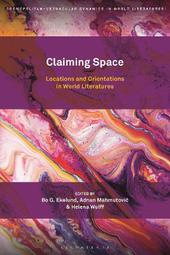
|
Claiming Space: Locations and Orientations in World Literatures
Hardback
Main Details
Description
This open access book explores literary works and practices - always existing in the dynamic relation between locations and orientations - in a series of carefully designed case studies. Explicitly expressed or implied, manifesting itself sometimes as dislocation and disorientation, the claiming of space by any symbolic means necessary is revealed as a constant effect of literary endeavors. In dialogue with geopolitics of culture, sociology and anthropology, attention to literary locations and orientations brings spatial particularity into the study of world literatures. These case studies demonstrate that four key terms (cosmopolitan, vernacular, location, orientation) can frame analyses of very different types of literary acts and texts in the contemporary period, allowing for distinctions that are not captured within the grids of other conceptual pairs like centre-periphery, local-global, postcolonial-metropolitan, North-South. With this framing, expressive practices in a wide range of regions - including Europe, Africa, the Middle East and the Pacific - are analysed in ways that bring out how spatiality is at stake in the cosmopolitan-vernacular dynamic. The eBook editions of this book are available open access under a CC BY-NC-ND 3.0 licence on bloomsburycollections.com.
Author Biography
Bo G. Ekelund is Professor of English at Stockholm University, Sweden. He has published articles on a variety of literary topics from a sociological perspective, in Poetics, Novel, Ariel, The International Fiction Review, and other journals. Adnan Mahmutovic is Associate Professor of English at Stockholm University, Sweden. His publications include Ways of Being Free: Authenticity and Community in Selected Works by Rushdie, Ondaatje, and Okri (2012) and Visions of the Future in Comics: International Perspectives (co-editor with Francesco Alesio Ursini and Frank Bramlett, 2017). Helena Wulff is Professor Emerita of Social Anthropology at Stockholm University, Sweden. Her research is in the anthropology of literature and writing. Among her publications are The Anthropologist as Writer: Genres and Contexts in the Twenty-First Century (2017) and Rhythms of Writing: An Anthropology of Irish Literature (Bloomsbury, 2019).
ReviewsThis dazzling collection of essays about world literature brings the vernacular into dialogue with the cosmopolitan. The value of this aim is now beyond dispute, what this book delivers is an account of how to do it. * Nikos Papastergiadis, Director of the Research Unit of Public Cultures, University of Melbourne, Australia * Claiming Space opens new perspectives on the complex terrain of world literatures, mapping the intersections of space, place and literary production in revelatory ways. The volume brings textured and insightful case studies into conversation with a lively, subtle and distinctive theoretical sensibility. * Don Brenneis, Professor of Anthropology, University of California Santa Cruz, USA * A superb intervention into the ongoing debates around world literature. The essays in this important edited collection significantly advance geocultural and geopolitical understandings of world literature, making a vital contribution to the field. * Michael Niblett, Associate Professor of Modern World Literature, University of Warwick, UK *
|